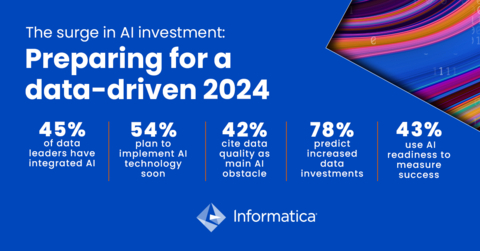New Research from Informatica Reveals More Data Leaders Plan to Capitalize on Generative AI, but Data Quality Remains the Key Obstacle to Adoption
- None.
- None.
Insights
Investments in data management capabilities are a strategic priority for businesses aiming to leverage generative AI (GenAI). The anticipated increase in data investments for 2024 underscores a significant trend: companies are prioritizing the enhancement of their data infrastructure to support advanced analytics and AI applications. This trend is likely to drive demand for data management solutions, which could positively influence the performance of companies like Informatica that operate in this space. For stakeholders, this translates into potential growth opportunities, as effective data management is crucial for unlocking the value of data assets and gaining competitive advantages.
Furthermore, as enterprises invest in overcoming technical and organizational roadblocks, there will be an increased need for integrated solutions that can handle the complexity and scale of data operations. This could lead to a surge in partnerships, mergers and acquisitions within the industry as companies seek to enhance their capabilities. The ripple effect of these investments might also be seen in the job market, with a rise in demand for data professionals and experts in AI implementation, potentially leading to a shift in the skills required in the workforce.
The unanimous decision among data chiefs to invest in data management capabilities signals a robust outlook for the data management and analytics sector. For investors, this is an indicator of where capital is flowing and which sectors may experience growth. The strategic focus on data management by enterprises could lead to an uptick in revenue for companies like Informatica that provide these services. It's important to monitor how these investments translate into financial performance, especially in terms of revenue growth, margin expansion and market share gains.
Given the potential increase in demand for data management solutions, there may be upward pressure on the stock prices of companies in this sector. However, investors should consider the competitive landscape and the ability of companies to differentiate their offerings. The effectiveness of these investments in driving actual business outcomes will be critical in determining long-term shareholder value.
As companies increase their investments in data management and generative AI, they will also need to navigate a complex regulatory landscape. Data privacy laws, such as GDPR in Europe and various state-level laws in the U.S., will have a significant impact on how data is managed and utilized. Companies must ensure that their data management strategies are compliant with these regulations to avoid legal repercussions and maintain customer trust.
Furthermore, as data becomes a more critical asset, there will be an increased focus on data governance and ethics, especially in the use of generative AI. This could lead to the emergence of new legal frameworks and standards governing AI use. Companies that proactively address these legal considerations and integrate them into their data management capabilities will be better positioned to mitigate risks and capitalize on the opportunities presented by GenAI.
To overcome AI roadblocks, three in four (

(Graphic: Business Wire)
“Unsurprisingly, generative AI implementation and the data strategies needed to do so successfully continue to dominate bandwidth for most data leaders, regardless of region or vertical,” said Jitesh Ghai, Chief Product Officer at Informatica. “While there remains a myriad of technical and organizational hurdles that these leaders must navigate, it’s clear investments in holistic, highly integrated data management capabilities are the key to unlock the vast potential of GenAI and empower enterprises to take full control of their ever-expanding data estates.”
Chris Eldredge, VP, Data Office at Paycor said, “AI is only as good as the data that trains it, which means for us to be a successful AI and generative AI organization we must first be a successful data and data management organization - and that will remain a top focus for us in the months ahead.” Eldredge added that while many of Paycor’s priorities from 2023 have remained relatively unchanged, they cannot ignore the meteoric rise of generative AI. “We are seeing adoption of process-specific solutions across a variety of use cases and business areas. This will, ultimately, lead to an even greater need for consistent, aligned and accurate data across the entire enterprise.”
Key Findings
-
Generative AI adoption is already well underway
-
Nearly half (
45% ) of data leaders reported they’ve already implemented generative AI, with an additional53% who anticipate they will, including36% who expect to within the next two years
-
Nearly half (
-
Data quality continues to be a major hurdle to generative AI adoption
-
Nearly all (
99% ) generative AI adopters have encountered roadblocks -
42% of data leaders cited data quality as the main obstacle, followed by data privacy and governance (40% ) and AI ethics (38% )
-
Nearly all (
-
Despite challenges to generative AI implementation, the juice will be worth the squeeze
-
73% of data leaders use or plan to use the technology to improve time to value with faster data insights, while66% want to drive more productivity through automation and augmentation
-
-
Data readiness is top of mind when it comes to AI and data strategy ROI
-
43% of data leaders reported that improving readiness of data for AI and analytics is the most common metric to measure data strategy effectiveness, a shift from our 2023 finding indicating the top metric was to improve how data is utilized in business decision making (45% )
-
-
Data fragmentation and complexity persists and is expected to worsen in 2024
-
41% of data leaders struggle to balance 1,000-plus data sources, a decrease from last year (55% ), but79% expect this number to increase in the year ahead -
58% of data leaders say they’ll need five or more data management tools to support their priorities and manage their data estates, an increase from 2023 (50% ) -
39% of data leaders reported the increasing number of data consumers is the top technical obstacle to realize their data strategy, while38% said it was the increasing volume and variety of data. Last year, the main obstacle was a lack of a complete view and understanding of their data estates (the fourth-highest obstacle in 2024)
-
-
Internal organizational resistance also threatens to derail data strategies and priorities
-
98% of data leaders admitted organizational obstacles hold back their data strategies, including a lack of leadership support (45% ), inability to justify ROI for budget (45% ), and lack of cooperation/alignment across business units (44% )
-
-
Investment in generative AI is driving mutual investment in data management
-
Data leaders cited the ability to deliver reliable and consistent data fit for generative AI (
39% ) and improving data-driven culture and data literacy (39% ) as the top data strategy priorities in 2024, a shift from the 2023 report where the ability to improve governance over data and data processes was the top data strategy priority (the third-highest priority in 2024) while the ability to deliver data fit for analytics and AI was the seventh-highest -
Data privacy and protection (
45% ), data quality and observability (41% ), and data integration and engineering (37% ) remain top data management capabilities to invest in to support these priorities
-
Data leaders cited the ability to deliver reliable and consistent data fit for generative AI (
These findings emphasize the intrinsic connection between generative AI adoption and sound data management strategies, and the increased priority data leaders around the world have placed on both in the year ahead. While this new era of AI promises plenty of potential, it guarantees increased complexity for enterprises and data leaders, from the management of disparate and evolving data ecosystems to the countless data and organizational roadblocks to implementation. As the report states: “With AI and data management, data leaders can recognize that it is not one driving the other, but rather that the two go hand in hand - and making the most of both means transformative change for these technologies, leaders’ strategies, and the future of their organizations.”
To discover more insights on how to plan a successful AI future, download the report here: https://www.informatica.com/lp/cdo-insights-2024-charting-a-course-to-ai-readiness_4656.html
About Informatica
Informatica (NYSE: INFA), an Enterprise Cloud Data Management leader, brings data and AI to life by empowering businesses to realize the transformative power of their most critical assets. We have created a new category of software, the Informatica Intelligent Data Management Cloud™ (IDMC). IDMC is an end-to-end data management platform, powered by CLAIRE® AI, that connects, manages, and unifies data across virtually any multi-cloud or hybrid system, democratizing data and enabling enterprises to modernize and advance their business strategies. Customers in more than 100 countries, including 85 of the Fortune 100, rely on Informatica to drive data-led digital transformation. Informatica. Where data and AI come to life.
View source version on businesswire.com: https://www.businesswire.com/news/home/20240131968092/en/
Informatica Public Relations
prteam@informatica.com
Source: Informatica
FAQ
What did the Informatica survey reveal about data investments in 2024?
What percentage of data leaders plan to invest in data management capabilities?
What does the report provide insights into?
Who is the Chief Product Officer at Informatica?







